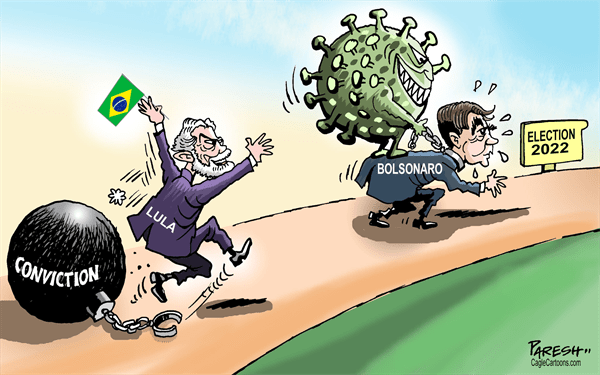
Brazil is full of opportunities…if you ignore the populist rhetoric that will accompany the October 2022 elections
Mark the calendar for 2 October 2022. Brazilians are already focusing on the date because general elections to elect the President, Vice President, and National Congress will take place then.
The date could either mark the return of former Brazilian President Luiz Inacio Lula da Silva or a validation of Brazil’s shift away from his leftist politics under current President Jair Bolsonaro.
The return of Lula to the political scene is both surprising and expected after a Supreme Court judge annulled Lula’s past convictions and restored his right to run for office – a surprise because it was these convictions that prevented Lula’s return in the last election and expected because Lula has been running for president (as a candidate or with a proxy) since 1989 with his own victories in 2002 and 2006.
Why Does This Matter to Investors?
Brazil is in economic (and social) turmoil today. The Brazilian economy contracted more than 4% in 2020. And nearly half-million Brazilians have lost their lives to covid-19.
Lula’s political resurrection all but ensures both a polarizing presidential campaign cycle and an elevation of the populist rhetoric and policy agenda. Local economists and businesses are already preparing for Bolsonaro to abandon his conservative campaign pledges slowly and strategically, in particular his economic promises, in order to win more votes.
When the news of Lula’s political return was revealed back in March, the Brazilian real plummeted to within 10 cents of its all-time low against the dollar, signifying the market’s concern over a potential shift in policy. The currency sadly remains one of the world’s worst-performing currency, only trailing the Libyan dinar and the Sudanese pound.
Further fueling the anticipation for a populist political battle, a survey by pollster Datafolha published last month showed Lula handily defeating Bolsonaro with 55% in a run-off vote if the 2022 elections were held today.
Volatility Creates Opportunity…
The takeaway of the story is Brazilians can prepare for more volatility in the near term (likely right until election day). Do not be surprised if the unwinding of fiscal support from last year is slowed or replaced with similar support but dressed in different clothes. Though inflation is likely to be the counterbalance to any ambitious populist agenda, the precarious (and potentially flippant) nature of policymaking in the short term will remain.
Following the election of any candidate, Brazil will have to outline a robust path towards fiscal sanity, including clear guidelines for fiscal spending (including a debt ceiling) and the conditions for the gradual expiry of temporary fiscal measures. An improved covid-19 outlook in the country (it has to happen despite all the leadership blunders) and strong commodity markets should translate into the restoration of fiscal credibility for the country. Despite the contentious politics, the government has passed a covid-19 emergency package twice and the pro-reform Minister of Economy Paulo Guedes continues to push rather rational orthodox macroeconomic policies (despite having his suite of objectors and naysayers).
The underlying factors of the Brazilian economy remain strong. The central bank forecasts 3.6% GDP growth for 2021 while Minister Guedes suggests 4% is possible. A lack of lockdowns is underwriting those numbers. And, although many have died during the pandemic due to the lack of lockdowns, it is not clear more than a year later that those lockdowns could have necessarily stopped the deaths (India’s situation demonstrates the challenges of timing the right lockdown measures).
The volatility in the system is creating investment opportunities with asset prices still low. For example, real estate prices remain distressed with commercial real estate prices in Sao Paulo rising less than 1% (according to analysts) compared to inflation north of 5% as the timing for the return of in-office work and international business remains uncertain. Rents are low today, which is bad for yield, but these opportunities are pure valuation plays which involve taking a view on Brazil’s natural ability to survive and revive. The currency devaluation also underwrites the upside for real estate (and many other sectors) with a square meter costing more than 50% less at $1300 to $1400 today compared to $3000 or so in 2014.
Investors should be prepared to ride the upsurge of news and polarizing rhetoric. But after the 2022 election and the acknowledgement of a winner, Brazil’s economy and policy will normalize. There are concerns with Brazil’s large public-debt up from around 70% in 2019 to 90%+ today. But externally, the country’s balance sheet remains strong, with large reserves and low public external debt.
Accordingly, the sovereign and sovereign-like institutions (i.e., infrastructure-related sectors) are basically seeking funding to bridge to a post-2022 election and a post-covid world and are willing to pay a healthy price for that funding (see Oi S.A. in Brazil). Also helping investors is the reality that downside risks and sovereign risks are generally already priced into the system.
A Lula win or Bolsonaro re-election will not change the ultimate reality: the next Brazilian president will have to steer this economic ship to safe grounds. That reality creates opportunity for the right capital ready to take the risk today and ride that wave to stable ground.
.
